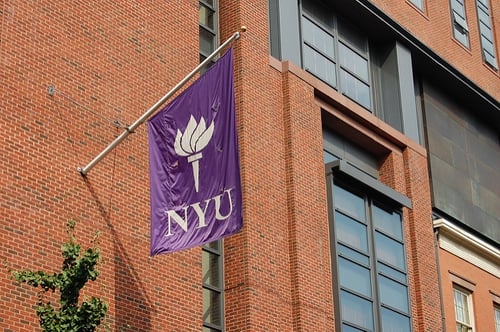If You Apply for a College and Get Declined Can You Try Again?
You've sent out your applications and can't stop envisioning yourself at your peak-selection school. But and then the unthinkable happens: you get a college rejection letter. You outset to wonder: what went incorrect? What do I practise at present? Is information technology still possible to attend my top-choice school? The truth is that I've been in this exact same situation. In 2008, I got rejected from my top-choice school, Stanford. Though the rejection letter injure, on the plus side, information technology taught me a lot about what I did incorrect, both in my awarding and my overall loftier school career. In this article, I use my own rejection experience as a guide to explain how likely a higher rejection is for you, how to avert getting rejected from college, and the steps to accept in case your elevation-option school but isn't that into you. Get-go things offset, how likely is it that you'll actually go rejected from college—more importantly, from your peak-choice school? The answer to this question varies depending on 2 main factors: As yous might've guessed, your chances of getting rejected from college depend a lot on how hard your height-option school is to get into. Many students' top choices are Ivy League institutions, such as Harvard, Princeton, and Columbia, or other prestigious top-25 schools, such equally Stanford, Rice, and the University of Chicago. Now, what do many of these schools accept in mutual? That's correct: extremely depression credence rates. These rates dramatically affect your likelihood of getting accepted (or getting rejected). Below are the credence rates for the meridian 25 universities, as adamant by the most recent US News rankings for 2022. All schools are listed in lodge of ranking. (Pro tip: click the school proper name to acquire more than well-nigh its access requirements!) As yous tin see, your chance of acceptance to height-tier colleges ranges from just 4% to as much as 21%. Your chance of higher rejection is highest for schools ranked in the pinnacle 10. At these colleges, the typical bidder has a whopping 90-95% chance of getting rejected. These are very, very general estimates, though. How high or low your chances of rejection are volition ultimately depend on the overall force of your application (we hash out this more below). To get a slightly more accurate thought of your access chances to a detail school, use our college admissions calculator. Still, the point is clear: most applicants to highly selective schools get rejected. Your risk of getting a college rejection alphabetic character will be less likely if your top-choice schoolhouse is ranked lower and has a higher access rate. The other major factor that affects your chances of getting rejected from college is the strength of your application. A stiff college application unremarkably has the following features: For the Ivy League and other highly competitive schools, you'll definitely demand to stand up out from other applicants. And the best way to do this is to create a big spike in your application. A spike is essentially something you're passionate near and have continuously striven to master. It could be annihilation from a love of writing short stories to a passion for chemistry. Most importantly, your spike should exist a field you're truly committed to and for which you have sufficient show to show your commitment. If y'all have a spike too equally loftier test scores, a high GPA, etc., you'll have a much improve chance of being a acme-choice candidate for your school. All of this also ways that you should avoid aiming for a well-rounded application. This tin put you right in the crapshoot of higher applications, significantly reducing your chance of acceptance (and thereby increasing your chance of rejection). For more tips on how to put together a strong application, look at a real Harvard application and acceptance letter, supplied by our resident perfect SAT/ACT scorer. Some of yous reading this might be wondering why I'm writing this article. Well, let me start with some facts. Rejection is nothing new to me. I applied to college in 2008 (yeesh, I'yard getting old!). At the time, Stanford was my pinnacle option, so I applied restrictive early activity, significant that my application was due earlier (past November 1) and that Stanford was my #1 pick for college. A little while later, I received a rejection by email. It was the get-go university I heard back from in the awarding process, and its letter was by far the nigh painful. I remember bursting into tears as soon as I finished reading information technology and so running to my parents for comfort. Then many questions ran through my head: how come up they didn't like me? What did I practice wrong? Did I mess upward my awarding somehow? Was I simply not practiced enough? Months after, I got accepted to USC and decided to nourish that school instead. And I had a blast: I joined a couple of clubs, wrote for the schoolhouse newspaper, worked on campus, fabricated good friends, and had an overall fun and eclectic feel I'd never trade for anything. Sometimes, though, I think dorsum to that initial college rejection and wonder: how did I manage to get through such a difficult, stressful time in my life? And how tin can I use what I know now to assist other students in the same position I was once in? Here's why I'grand telling you all of this: Now that you know my story, let's kickoff with the positives: how to avoid getting rejected from college in the first place. If this doesn't work out for you, no worries—I'll also give y'all communication on what to practice if yous exercise get rejected. Since getting my first college rejection from Stanford, I can tell you this: I've learned a lot well-nigh what I did wrong in my application. For one, my application wasn't unique enough. I didn't take a "spike" that fabricated me stand up apart from other applicants; instead, I naively believed in the misconception that well rounded was what all tiptop schools wanted the nigh. (Hint: information technology'south not!) In improver, my SAT score wasn't up to par. At the time I thought I'd done fairly well on the exam, just I didn't realize that pretty good isn't ordinarily good enough for top schools similar Stanford. These days, you'd need to score at least a 1500 (or in the height two%) only to encounter the average at Stanford! Finally, I didn't take advantage of the AP/honors classes available at my high schools (I moved and attended two schools). I recall thinking that two or three AP classes and a couple of high AP scores would be proficient enough. Once again, though, this isn't that impressive to top-ranked schools. So what tin can you do to ensure that y'all have a improve chance of getting into your top-option school? Here are my pinnacle half dozen tips. Most students probably know this, but you'll need a pretty high GPA to proceed from getting rejected. Why? Well, a high GPA proves that you're not simply responsible and studious but also capable of performing consistently well in a multifariousness of disciplines. By excelling in several classes, you're providing direct evidence of your deep commitment to learning and bookish success. And so what constitutes a high GPA? The respond to this will depend on the school you're applying to. If y'all're applying to a acme-25 schoolhouse such as Stanford, aim for a 4.0 (unweighted ) or pretty close to it. If you're not certain how high of a GPA your school expects, endeavour looking on the schoolhouse's website for any information or information virtually the average GPA of admitted applicants. That beingness said, getting a high GPA alone isn't as important as getting a good GPA and taking a challenging course load. Here's what I mean by this: when applying to top colleges, a 4.0 unweighted GPA is no doubt peachy. However, you'll be a much more competitive applicant if you lot have, say, a slightly lower three.8 GPA and have also taken loads of challenging AP/honors courses. This means that yous could get by and large As and a couple of Bs in challenging AP courses and still accept a higher run a risk of getting accustomed over someone who got all As only took only like shooting fish in a barrel classes. This is because colleges like to see that yous're continuously challenging yourself. For me, this was a disquisitional indicate I didn't get at all in high school. I took a few AP and honors courses, but I didn't have nigh as many as I should have. Instead, I stuck mostly to classes I knew I'd get As in and refrained from truly challenging myself by taking harder ones. This is probably part of the reason Stanford rejected me. Like the tip above, this is kind of a no-brainer, but you'd be surprised how little I idea of information technology when I applied to higher back in 2008. NOTE: Equally a result of the pandemic, nearly every school became examination-optional for at to the lowest degree 2020 and 2021, and some schools have decided to become permanently test optional. This ways that, if you lot're applying to one of these schools, you don't need to submit SAT or ACT scores, and your application won't be at a disadvantage. However, a high ACT or SAT score can still exist a significant boost to your awarding, specially if you're on the bubble in other areas. While colleges empathise that the SAT/Act is merely one part of your application, it'due south still pretty of import to become a high score on one of the 2 tests—especially a score that sets you apart from other applicants. A adept Sat/ACT score volition vary depending on the schools y'all're applying to. For instance, if you were applying to Harvard, you'd desire to aim for 1580 on the SAT or 35 on the ACT. These are the 75th percentile scores for admitted applicants to Harvard. In other words, get this score level and you'll have a higher score than 75% of applicants. Even if you got slightly lower than this—such as a 1570 on the Saturday or a 34 on the Deed—you'd all the same be in relatively good shape. The indicate, withal, is that you want to shoot as high as possible so you can give yourself the best chance of admission. On the other hand, if y'all were applying to a less selective school like the University of Houston, yous'd merely need an Sabbatum score effectually 1300 or an ACT score around 27. Again, you could still get accepted with slightly lower scores than these, but aiming high ensures you'll have a great shot. As you lot tin can see, what'southward considered a high SAT/ACT score will depend profoundly on where you're applying. If you tin can hit (or almost hitting) your elevation-selection schoolhouse's 75th percentile score, you'll stand out and lower your chances of rejection. To find your schoolhouse's exam score information, search for "[School Name] PrepScholar" on Google. Click our link to the school's Admission Requirements page to run into the school's average SAT/ACT scores and its 25th/75th percentiles. This slice of advice is essential for those applying to the Ivy League or Ivy League-level institutions (and it's definitely something I wish I'd known back when I applied to Stanford). And here'south what it is: function of crafting an incredible college application is working on developing a spike. I briefly introduced this concept earlier, but now permit's look at in detail. Your spike is what makes you stand out from other applicants. This is typically an ongoing passion for and commitment to some kind of academic or personal involvement. For case, perhaps you're a lover of writing who's published his own self-help ebook and tutors elementary school students in creative writing on weekends. Or maybe yous're a scientific discipline whiz who'south conducted numerous experiments and submitted her results to conventions. Become the picture here? Call back of this spike equally the opposite of beingness well rounded. When I practical to Stanford, I assumed that well rounded = automated acceptance. I was a member of my school's honor gild, ran on the cross land team for two years, and played the piano in my spare time. All of this, I thought, made me a well-rounded, ideal candidate. Boy, was I wrong. In truth, colleges—particularly selective ones like Stanford—see tons of applicants similar this. This is likely a big reason I got rejected: I wasn't unique plenty! Instead, I should have spent more time developing the hobbies I enjoyed most and participating in activities more strongly tied to my most passionate interests. That's what I did incorrect. Now, here's what you tin do right. Below, I listing some options yous tin can try to help yous further develop your spike: All in all, don't rely on the trap of existence well rounded, specially if yous're trying to get accepted to highly selective schools. Fifty-fifty if you've got both stellar grades and a high SAT/ACT score, schools want to run into that you're an interesting, passionate person who is committed to learning. This is why information technology'southward of import to spend a lot of time crafting an impactful personal statement for your application. In full general, a good personal argument will accomplish the following: The statement is a great opportunity to explicate what your fasten is, how you got interested in information technology, and what kind of role you run across it playing in your future. For a detailed look at what makes for a powerful personal statement, cheque out our analysis of more than 100 college essays. In add-on, the personal statement lets you explain the context of your bookish situation. For case, does your high schoolhouse not offering whatsoever AP or honors courses? Or are you the first person in your family to nourish college? It's important to reply questions like these in your essay so that the school can take into account your personal circumstances also equally how these might take influenced the quality of your application. This way, you won't get rejected but because you didn't take any AP courses (even though none might have been available to you!). Many schools stress the importance of considering each applicant'south circumstances. For case, here's what Stanford says on its website: "We take into account your groundwork, educational pathway, and work and family responsibilities. By focusing on your achievements in context, we evaluate how y'all have excelled in your schoolhouse environment and how y'all have taken reward of what is bachelor to y'all in your school and community." And here'due south how Duke considers your background in applications for admission: "As a office of our holistic approach, we consider both your academic and personal interests, what yous've achieved, and your unique experiences, perspectives, and background." Evidently, the personal argument isn't just an opportunity to showcase your spike and strengths—it'south also a take a chance to explain your personal state of affairs. Practise all of this, and you'll be far less likely to become rejected for something like a slightly lower Sat score. Want to write the perfect college awarding essay? Go professional help from PrepScholar. Your dedicated PrepScholar Admissions advisor will craft your perfect college essay, from the ground up. We'll larn your background and interests, begin essay topics, and walk you through the essay drafting process, step-by-step. At the stop, yous'll accept a unique essay that you'll proudly submit to your superlative choice colleges. Don't leave your college awarding to adventure. Find out more nigh PrepScholar Admissions now: If your meridian-choice school offers an early action or early decision plan, definitely do it (but only practise the latter if y'all're 100% sure this is the school y'all want to attend). Well-nigh early on action/early decision deadlines are Nov 1 or Nov 15. These deadlines are nigh a month or 2 earlier than well-nigh regular decision deadlines. So how does applying early activeness/early determination affect your admission chances? Data shows that those who apply early action or early decision typically take higher acceptance rates than those who apply regular decision. This doesn't necessarily mean yous'll get accepted. I practical early on action to Stanford and still got rejected. Nevertheless, an early application might requite y'all a slight edge over other applicants, every bit it shows the school you're committed to it and really want to proceed your didactics there. The only drawback to applying early activity/early decision is that the early deadline gives y'all less fourth dimension to put together a strong application. If y'all're struggling to prepare an effective application for an early action plan, consider applying regular conclusion instead to requite yourself more time. This leads me to my next indicate ... Whether y'all're applying early activeness/early decision or regular determination, information technology tin can be tempting to rush through the application process, especially since most students are extremely busy at the start of senior twelvemonth. Even though this is a stressful fourth dimension, endeavour your best not to rush through your awarding to your acme-choice school. Simply put, don't write your personal statement the twenty-four hours before the deadline, and don't ask for letters of recommendation from teachers at the last minute. Why is this so important? If you spend too little fourth dimension working on your application, yous run a much higher risk of doing the following: I propose spending at least a few months on your college applications. And while all applications are equally of import, it'south OK to spend a little extra time on the awarding for your top choice, if only because information technology's the school you're virtually interested in. Also, don't exist afraid to ask questions by emailing or calling the school. For example, confused about application instructions? Transport an email. Non certain what a "supplementary document" is? Telephone call the admissions department. Improve to make certain you're following the rules than to gamble getting your awarding disqualified considering you fabricated a huge (merely entirely preventable) mistake. When I practical to Stanford, I idea I'd taken my time to do the awarding, only I really hadn't. It was only later on I submitted information technology that I realized I'd made some dire mistakes. Here's my most memorable: at the time, Stanford allowed applicants to adhere supplementary files. So I attached a sample chapter from a novel I was writing to prove my passion for writing. But after submitting my application, I reread the application instructions and realized that chapters of fiction was something Stanford specifically requested applicants to not send in. Oops! Unfortunately, fifty-fifty if y'all heed all the tips above, you could yet wind up with a college rejection letter. I'll exist honest: getting rejected sucks. But it certainly doesn't mean your academic career (or life, if you're dramatic like me) is over. Here are some ways to cope with a college rejection, as well as options on what to do after you go rejected from college: This is actually, really important. Once you become the dreaded college rejection letter from your top-choice school, it tin feel as though the whole globe is crashing downwards effectually you. I'g here to tell you that this feeling is totally normal. Afterwards all, you're essentially grieving—sounds cheesy, I know. But information technology's the truth. And when something bad happens, it's important to have fourth dimension to allow yourself feel deplorable about it. In this instance, even though you likely worked really hard in school, you lost the opportunity to attend the college of your dreams. All of your hereafter plans must change, which sucks. It's OK (and fifty-fifty expected) to be upset nearly this. Hither are some healthy options for coping with a college rejection: Although grieving is important, don't permit yourself get wrapped up in your sorrows for as well long. In one case you've given yourself ample time to cope, get off the footing and focus on the other options you lot've got in your life. Also, attempt not to let the rejection negatively impact your grades, extracurriculars, and other college applications (if you haven't finished all of them yet). While your top-choice school might've rejected you, remember that this is only one schoolhouse, and yous (hopefully) accept several others yous're applying to or already applied to. These are the schools it's time to get excited about, regardless of whether you've heard dorsum from them. In that location is a reason you applied to each school you applied to. As y'all go through the schools y'all've been accepted to, concentrate on the specific features and opportunities you liked about each school. For example, what inspired you to utilise in that location? Tin you envision yourself feeling at home on campus? What kinds of classes and majors does information technology offer? Do yous like its accent on Greek life? What about its crawly football game team? If possible, talk to current students at the schools so you tin can start to imagine yourself attention them. Doing this will not only make you excited about your other options just will also prevent you lot from daydreaming about what might've happened had you been accepted to your peak option. Finally, remember that y'all will probable be able to study what you want to at these other schools as well. Just considering your pinnacle-selection school rejected you lot, that doesn't mean yous still tin can't become a BA in Psychology or a BS in Information science. If you lot didn't get accepted to your top-choice school, a gap twelvemonth tin can assist y'all effigy out what kind of education you want in life while as well providing yous with some interesting experiences (which could potentially strengthen future college applications!). Later your gap yr, you can then reapply to your top-choice school, with a fresh perspective and a slightly better understanding of where your application might've gone wrong before. While there's nothing wrong with taking a yr off before college, exist certain y'all're actually making your gap yr worthwhile. Neither colleges nor your parents will be impressed if all y'all do is sit at dwelling and play video games all mean solar day. Make your gap year an adventure: work a new chore, travel abroad, intern at a company, join a community order, learn a foreign linguistic communication. Hopefully, you lot'll get experiences out of your gap year that'll help you in the field you want to major in. For example, if you're thinking about majoring in English, taking a year off to write a novel and submit stories you've written to literary magazines would be an excellent utilize of your time (assuming your parents are OK with it, of grade!). Later, when y'all begin the procedure of reapplying to your top-choice school, you tin can explain in your application what yous did during your gap year and why yous chose to take a yr off before starting higher. If you decide to reapply, information technology's a adept thought to use your old application as a reference. Think about where you lot might've gone wrong and how you tin can improve on it this time (ideally, by incorporating some of your gap-year experiences into it). A give-and-take of caution, though: don't put all your eggs in ane basket. In other words, don't look to get admitted simply considering yous applied earlier and at present deserve to get in. Admissions is often a barbarous process, and nobody (except those on the admissions commission) knows what a college is looking for in terms of applicants. So as you reapply to your top-choice school, make sure yous're applying to other schools as well—ideally, a combination of reach schools and safety schools. If y'all determine to nourish a different school yous got into (which nigh people do, including myself!), know that it might exist possible to transfer to your elevation-choice schoolhouse in a couple of years. While I wouldn't nourish a different higher with this exact plan in mind, knowing that transferring is an pick in case you still really want to attend your top-choice school should make you feel a piffling more at ease with your decision to (temporarily) nourish a unlike schoolhouse. Note that to transfer to a school, you'll commonly need to submit an entirely new transfer awarding meaning that information technology can't be the same i you submitted before when applying every bit a freshman. Moreover, transferring is not guaranteed. Many schools, especially the Ivies, accept very few transfers each year. Harvard stated that they typically accept almost 15 transfer students out of about 1,500 application, an acceptance rate of 1%. As you tin encounter, here you actually have a lower gamble of getting accustomed every bit a transfer pupil than yous do as a freshman applicant (the current acceptance charge per unit for which is iv%). If you lot're curious about the transfer acceptance charge per unit at your top-choice school, contact your school directly or check out CollegeTransfer.net, which contains tons of information on schools and their transfer rates. In the end, though, who knows what'll happen? Y'all might end upward loving the school you attend and wouldn't even consider transferring out of it. In that location is i final choice you take when it comes to college rejection, though information technology'southward one I honestly don't recommend doing: appealing, or challenging, your rejection. Challenging a college rejection is pretty much what it sounds similar. When you become rejected, you lot take the option to tell the higher you remember they're wrong and ask them to reconsider your awarding. So what's the problem? You can't appeal your rejection merely because y'all're upset that you didn't get accepted. This is not a proficient enough reason to enquire a college to look at your application again. Even if a school did concur to reevaluate your awarding, it'southward unlikely a second expect-through would modify their minds (peculiarly if your main complaint is that they failed to recognize how absolutely incredible you are). Instead, you can merely appeal a college rejection if you accept whatsoever new, meaning information to add together to your application, or if in that location was a major error or problem with your application. For example, did yous win a big award or somehow dramatically improve your GPA? Then see whether you can entreatment the rejection. (Not all schools will permit you do this, though!) In terms of technical problems, did your Saturday/Human action score get reported incorrectly to your college? Or did your transcript get messed up and evidence you lot got Ds when yous really got As? Then appeal the rejection; most probable the higher will allow information technology in this case since the trouble is not actually your fault. In some cases, colleges will not let yous to appeal your rejection at all (even if y'all won the Nobel Peace Prize). In fact, near tiptop-ranked schools don't allow appeals of admission decisions. If you lot disagree with their determination, y'all simply accept to await and reapply the post-obit yr. If you're not sure whether your top-choice schoolhouse allows appeals or non, look at the schoolhouse's official website or contact the school directly. While rare, it is possible to get into a higher through an entreatment (though information technology's absolutely far less likely to go far this way). Here's an example of a pupil who got accepted to UC Berkeley through an appeal. After getting my Stanford rejection alphabetic character, I cried a lot and talked to my parents. Eventually, I moved on and started to get excited nigh my other options. I ended up attention USC, where I had a fun, stimulating, and all-effectually memorable experience—something I wouldn't trade for the world! Notwithstanding, getting rejected isn't fun. Unfortunately, it can be a probable consequence if y'all're applying to highly selective universities and don't accept the grades or exam scores your schoolhouse expects. The easiest way to avert getting rejected from college is to produce the best application y'all can. For pinnacle schools, this means you should typically have the following: If possible, utilise early action/early determination to your top-choice schoolhouse. Applying early raises your chance of admission simply slightly, as it highlights your delivery to the school. Finally, brand sure to take your time with your application—don't rush whatever part of it! Permit's say you do all of this, though, and even so get rejected from your peak-choice school. Bummer. At this betoken, you've essentially got five options (which you can mix and match, as desired): No matter what you cull to do, take intendance to remind yourself that getting rejected doesn't mean you're a bad educatee or that your application was horrendous. It merely means that the school could only admit so many people, and you happened to not be ane of them. Even though the higher admissions process can feel like an uphill boxing, simply know that you're definitely not alone. Every bit we say at my alma mater, "Fight on!" Want more tips for raising your chances of getting accepted to higher? Check out our handy admissions calculator to learn how to gauge your chances of credence based on your electric current GPA and test scores. Need assist applying to Harvard and other top schools? This guide covers everything yous need to know to go into the nation's best colleges and universities. Struggling with the awarding process? We're here to aid! Our good guides teach you how to build a versatile college application and go over the awarding timeline to assist you lot pace yourself. Desire to improve your Sabbatum score by 160 points or your ACT score by four points? We've written a guide for each exam well-nigh the top 5 strategies you must exist using to accept a shot at improving your score. Download it for free now: 
How Likely Is Information technology That You'll Get a College Rejection Letter of the alphabet?
How Competitive Is Your Top-Option School?
School US News Ranking Acceptance Rate Princeton ane four% Harvard 2 (tie) iv% Columbia 2 (tie) 4% MIT ii (tie) iv% Yale 5 five% Stanford 6 (necktie) 4% University of Chicago 6 (tie) 6% University of Pennsylvania 8 six% Caltech 9 (tie) vii% Johns Hopkins 9 (necktie) 7% Northwestern 9 (tie) 7% Duke 9 (tie) 6% Dartmouth 13 half dozen% Brownish 14 (tie) 5% Vanderbilt 14 (tie) 7% Washington University in St. Louis 14 (tie) xiii% Rice 17 (tie) 9% Cornell 17 (tie) 9% University of Notre Dame 19 15% UCLA 20 14% Emory 21 13% UC Berkeley 22 17% Georgetown 23 (tie) 12% University of Michigan 23 (necktie) 20% Carnegie Mellon University 25 (tie) 15% Academy of Virginia 25 (necktie) 21%  You take a lower hazard of getting rejected from NYU than you practice from Columbia. (jpellgen (@1179_jp)/Flickr)
You take a lower hazard of getting rejected from NYU than you practice from Columbia. (jpellgen (@1179_jp)/Flickr) How Potent Is Your College Application?
My Experience: I Got Rejected From Stanford
 Unfortunately, my tips for avoiding rejection don't use to request people out on dates.
Unfortunately, my tips for avoiding rejection don't use to request people out on dates. How to Avoid Getting a Higher Rejection: half-dozen Tips
#1: Maintain a High GPA While Too Challenging Yourself
#2: Get a High Sabbatum/ACT Score
#three: Work On Developing Your Spike
 The but affair you want to be well rounded is the bubble you're blowing.
The but affair you want to be well rounded is the bubble you're blowing. #4: Write a Compelling Personal Argument and Consider Context


#v: Apply Early Activity/Early Decision, If Possible
#6: Take Your Time—Don't Rush the Application Procedure!
 Got rejected? It'southward OK to get a footling dramatic.
Got rejected? It'southward OK to get a footling dramatic. How to Deal With Higher Rejection: v Essential Tips
#one: Give Yourself Time to Process the Rejection
#2: Become Excited About Other Schools
 Apparently, you lot can even make your own Disney caste at UC Berkeley!
Apparently, you lot can even make your own Disney caste at UC Berkeley! #3: Take a Gap Year and Reapply Afterwards
#4: Remember That Transferring Is an Option
#5: Consider Challenging the Rejection
 Seriously, first a Disney major and at present a successful appeal? Starting to remember I should've attended Berkeley ...
Seriously, first a Disney major and at present a successful appeal? Starting to remember I should've attended Berkeley ... Determination: How to Deal With College Rejection
What's Next?



Most the Author
Hannah received her MA in Japanese Studies from the Academy of Michigan and holds a bachelor's degree from the Academy of Southern California. From 2013 to 2015, she taught English in Nippon via the JET Plan. She is passionate about educational activity, writing, and travel.
Source: https://blog.prepscholar.com/how-to-deal-with-college-rejection
0 Response to "If You Apply for a College and Get Declined Can You Try Again?"
Postar um comentário